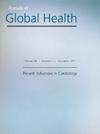Does Structural Violence by Institutions Enable Revictimization and Lead to Poorer Health Outcomes?-A Public Health Viewpoint.
IF 2.6
4区 医学
Q2 PUBLIC, ENVIRONMENTAL & OCCUPATIONAL HEALTH
引用次数: 0
Abstract
Although structural violence is known to interact with and reinforce direct violence in the form of interpersonal violence (e.g., intimate partner violence), little debate takes place in public health on how it can lead to revictimization, leading to even poorer health outcomes (including psychological ill health). This viewpoint aims to discuss this issue using examples from empirical studies to elucidate how structural violence (perpetrated through institutions) contributes to revictimization among people who are already suffering direct violence. Public health professionals (and researchers) need to make efforts to theorize and measure structural violence to aid efforts toward the study of how it intersects with interpersonal violence to influence health outcomes. This will ultimately contribute to better prevention and intervention efforts to curb interpersonal violence and improve population health and well-being. In addition, there is a need to include structural violence in the academic curriculum when training future generations of public health professionals. Increased education on structural violence will bring about an awareness of the grave consequences of the potential additional harm that institutions could inflict on the lives of people they should be protecting or care for.机构的结构性暴力是否会导致重新受害并导致更差的健康结果-公共卫生观点。
尽管众所周知,结构性暴力会以人际暴力(如亲密伴侣暴力)的形式与直接暴力相互作用并加剧直接暴力,但在公共卫生领域,很少有人讨论它如何会导致再次受害,从而导致更差的健康结果(包括心理疾病)。这种观点旨在通过实证研究的例子来讨论这个问题,以阐明(通过机构实施的)结构性暴力如何导致已经遭受直接暴力的人再次受害。公共卫生专业人员(和研究人员)需要努力将结构性暴力理论化和衡量,以帮助研究它如何与人际暴力交叉影响健康结果。这最终将有助于更好地预防和干预工作,遏制人际暴力,改善人口健康和福祉。此外,在培训未来几代公共卫生专业人员时,有必要将结构性暴力纳入学术课程。加强对结构性暴力的教育将使人们意识到机构可能对他们应该保护或照顾的人的生活造成的潜在额外伤害的严重后果。
本文章由计算机程序翻译,如有差异,请以英文原文为准。
求助全文
约1分钟内获得全文
求助全文
来源期刊

Annals of Global Health
PUBLIC, ENVIRONMENTAL & OCCUPATIONAL HEALTH-
CiteScore
5.30
自引率
3.40%
发文量
95
审稿时长
11 weeks
期刊介绍:
ANNALS OF GLOBAL HEALTH is a peer-reviewed, open access journal focused on global health. The journal’s mission is to advance and disseminate knowledge of global health. Its goals are improve the health and well-being of all people, advance health equity and promote wise stewardship of the earth’s environment.
The journal is published by the Boston College Global Public Health Program. It was founded in 1934 by the Icahn School of Medicine at Mount Sinai as the Mount Sinai Journal of Medicine. It is a partner journal of the Consortium of Universities for Global Health.
 求助内容:
求助内容: 应助结果提醒方式:
应助结果提醒方式:


